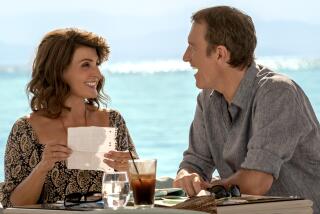Skopelos, AN UNSPOILED ISLAND in the Aegean
- Share via
SKOPELOS, Greece — To get to the island of Skopelos, you can take a small plane from Athens to the island of Skiathos and then a ferry to the next island. Or make your way to the coastal city of Volos (about five hours by bus north of Athens) and take the ferry or hydrofoil to Skiathos and then on to Skopelos.
I mention this so you’ll know that publicity can’t spoil this charming outpost of the Sporades Islands in the far Aegean. Even if the world wanted to beat a path to its door, only so many can arrive at any given time.
Sporades means Scattered Isles. The legend is that after the gods created the world they had a handful of pebbles left and they flung them over the northwestern Aegean, creating these islands (the four main ones are Skiathos, Skopelos, Alonissos and Skiros), all rich in vegetation and laced with beaches both sandy and pebbly, washed by the clear blue sea.
And what a beautiful village Skopelos is! Each whitewashed house seems balanced on the corner of another, with small Byzantine chapels here and there along the stone lanes that wind up and down the hillside.
The town is a mixture of architectural styles, with elements of Turkish, Macedonian and Neoclassical building, held together by slate (old) and red tile (new) roofs. The north end of town is lined by the ruined walls of the Venetian kastro (castle).
And everywhere, carnations and fuchsia bob from the balconies, geraniums overflow their pots, grapevines climb rickety trellises and bougainvillea tumbles from the walls. The streets are narrow and steep, the stones worn smooth by generations of footsteps.
Along the quay is a row of restaurants facing the water, each with its colorful canopy and quota of tables outside, in both sun and shade.
This is one of those fabled places that causes you to consider running off to a Greek island for a year or two to write that book or whatever. And at Jimmy’s restaurant, near the ferry landing, we were minor players in the drama of one man who did just that.
Our bit parts came at the end of his play. The somewhat scruffy young man, known to us only as “Jimmy’s friend,” was wrapping up a three-year stay on Skopelos. Time to move on. That meant time for a party.
Jimmy closed the doors to his restaurant, seated his friend in the place of honor and began to play his accordion, head back, eyes skyward, shoulders swooping from one side to the other as his own music stirred his soul. After a while, his friend got up and danced, and even though I had initially thought him homely, in dancing he was beautiful.
“I couldn’t stay here for longer than a few weeks,” someone else said. “The wind comes up and the shutters bang incessantly, and there is nothing you can do about it. If you fix the shutters, the wind still drives you crazy.”
Jimmy’s friend felt differently. He cried at leaving.
In the daytime we walked to the beach. The countryside is wonderfully green and rich.
Flowers grow everywhere. Roses bloom like weeds, wild and profuse, lush and fragrant. Roses of red, yellow, even purple, climbing fences and lining walls of the humblest dwellings. Plus wild poppies of the purest red and yellow daisies and dandelion puffs as big as lemons.
Shepherds tended their flocks in the meadows. Goats munched their way around spindly trees to which they were tied. Donkeys ambled past us, carrying old men in black caps who rode sidesaddle. Other donkeys carried baskets of produce to market.
The best beach was about two miles from town and another half a mile down a steep hill and past a popular taverna. All along the lee, sunbathers and swimmers staked their spot of sand for the day. Past them and around a rocky point and on its windward side was the nudist beach.
Lovely beach, a long stretch of clean gravely sand and pebbly ocean floor. Fair snorkeling; we saw a few fish, sea urchins among the underwater rocks below the cliffs. The island is ringed with a number of smaller beaches, isolated coves that one could have to oneself. Some of them are accessible only by boat.
In these hidden places, it’s so quiet; only the sound of small waves rolling the smooth rocks around.
On a map of Skopelos, the popular beaches are labeled as to how many tavernas they have. They range from “one cantina” to “three tavernas.” But the three-taverna beach turned out to be a ferry stop, and not only were the tavernas closed because there was no ferry that day, there wasn’t much of a beach.
The hillsides of Skopelos are covered with plane trees, pines and orchards of olive, citrus and plum trees. The island (less than 100 square kilometers) is also covered with 360 churches, chapels, monasteries and convents. A convent on the hillside above the town of Skopelos offers for sale fabrics woven and embroidered by the nuns who live there.
The children of Skopelos, the really little ones, play like lion cubs, batting each other but never hurting, boisterous but not aggressive. They play in the lanes in front of their houses; there are no cars to worry about.
Around every turn of the town is a picture to be painted, a photograph to try to capture forever the quality of beauty, of light, of serenity that is here.
Life in the town begins late, around 10 a.m., and goes on until midnight or so. Late lunch, late dinner, lots of sitting around, talking with friends. We had hoped for more music. We did see a young man carrying his bouzouki one evening after dinner, but he was on his way to a friend’s house. The pace, we were told, picks up as summer fills Skopelos to its capacity.
The ferry had come and gone, and we had about an hour until sunset. The sky was ripe with promise after a midday rain and then a rainbow. Brightly painted wooden fishing boats bobbed at the quay.
Cafes along the waterfront played cassette music, “Ave Maria” to Sha Na Na, but mostly of a Greek beat, that slightly irregular, slightly dissonant sound of a bouzouki that compels you to dance or at least tap your toes. Church bells clanged long and boisterously, as if orchestrated by a small gang of exuberant boys. We could have stayed weeks longer, at least.
Back on the day we arrived, the captain met the ferry. He drives a tiny truck about 4 1/2 feet wide that can navigate the narrow lane up the hill to his hotel. (His name is actually Siskos Kostos and his hotel is called The Captain.) In the off-season he and other hoteliers meet the ferry in the hope of picking off a few tourists to fill their rooms.
“In the summertime, they come looking for me,” Kostos said.
‘No Problem’
Still, there’s no pressure. After giving his price of $22 for a double with bath (others were even cheaper), the captain said, “I show you the room. No problem. You spend your money to be happy. If you don’t like my place, then I don’t want your money.”
Leaving Skopelos was more difficult than getting there, but it led to an experience that made us love Greece even more. We took the ferry from Skopelos back to Skiathos and sat all afternoon in an Olympic Airways office while it rained. (Olympic has an excellent safety record, apparently based on the philosophy: “When in doubt, don’t.”)
At 5 p.m. it was announced that our flight was canceled, and that furthermore the next two flights were booked solid. “But there’s a hydrofoil to Volos,” the young woman said cheerfully. “It leaves at 4:45.”
“But it’s already 5 o’clock!”
“No problem,” she replied. “It’s raining, so the hydrofoil is probably late.”
A Generous Greek
We raced through the rain to the pier and, sure enough, we just made it, and arrived in Volos two hours later. Unfortunately, we didn’t have quite enough drachmas (about $1 short) to pay for bus tickets to Athens, and no one would take travelers checks or American dollars.
Saturday night and we were stranded in Volos. We turned to leave the line.
The woman in line behind us was trying to get to her home in Athens. She had also waited in Skiathos all afternoon for that flight to Athens, and she had made the run for the hydrofoil, and was now planning to catch the night bus. She handed the clerk enough drachmas for three bus tickets, then she handed two tickets to us.
We were amazed. We tried to give her our useless money, knowing that $20 would cover the cost and they’d be happy to see it in Athens.
“No, a gift,” she insisted. “We are friends. And you can stay at my home; I have plenty of room. No problem.”
More to Read
Sign up for The Wild
We’ll help you find the best places to hike, bike and run, as well as the perfect silent spots for meditation and yoga.
You may occasionally receive promotional content from the Los Angeles Times.






